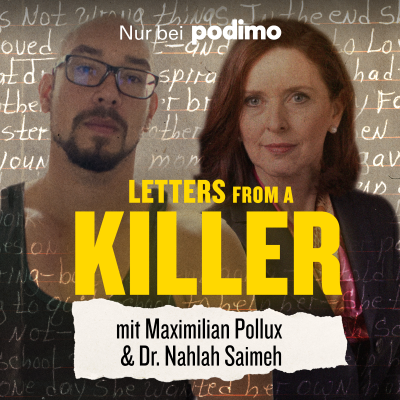
Reformed Thinking
Englisch
Gratis en Podimo
Kostenlos hören bei Podimo
Starte jetzt und verbinde dich mit deinen Lieblingspodcaster*innen
- Vertraut von über 1 Mio. deutschen Hörer*innen
- Über 1.000 lokale Podcasts und Shows – nur bei Podimo
- Keine Zahlung nötig
Mehr Reformed Thinking
"Reformed Thinking" is a podcast dedicated to unraveling the intricacies of biblical teachings and theological questions, influenced by the abundant heritage of Reformed theology and Puritan writings. Whether exploring weighty Bible passages or dissecting influential Reformed books and articles, our goal is to offer insights that not only cultivate intellectual expansion but also, and more crucially, spiritual edification. Join us as we traverse the depths of scripture and Reformed thought, aiming to enlighten and broaden your faith sojourn.
Alle Folgen
2352 FolgenEisegesis: When the Reader Becomes the Author—And How Exegesis Restores God’s Voice
Deep Dive into Eisegesis: When the Reader Becomes the Author—And How Exegesis Restores God’s Voice Interpretation of Scripture involves a high-stakes battle between the reader's voice and God's speech. Eisegesis occurs when an interpreter reads their own ideas, assumptions, or agendas into the text rather than drawing meaning from it. This practice reverses the direction of authority, making the reader the master of the text. In contrast, exegesis seeks the author's intended meaning through careful analysis of words, grammar, and context. Theologically, the rejection of eisegesis is rooted in the doctrine of Verbal Plenary Inspiration, which asserts that Scripture has an objective meaning given by God. Eisegesis often manifests through context neglect, where verses are treated as isolated slogans, or through genre confusion, where poetry or narrative are misinterpreted as literal contracts or moral checklists. Root causes include human pride, spiritual laziness, and the desire for self-affirmation. The Holy Spirit's role in interpretation is not to provide secret meanings, but to illumine the mind to understand what God has already spoken. The consequences of eisegetical reading are severe, leading to doctrinal distortions like the prosperity gospel, moralism, and antinomianism. Pastorally, it can falsely soothe the unrepentant or needlessly crush the weak by misapplying God's Word. It also enables spiritual manipulation by leaders who use selective proof-texting to justify personal agendas. The antidote is a disciplined, reverent exegesis known as the grammatical-historical method. This approach involves observation of the text's structure, syntax, and historical setting to discern the author's intent. It also utilizes the analogy of faith, letting Scripture interpret Scripture within its redemptive-historical context. Ultimately, faithful interpretation remains Christ-centered, grounding moral imperatives in the indicative of the gospel. By submitting to the text, the interpreter serves as a herald of the King's decree rather than an editor who revises His words. Exegesis ensures the Bible remains the living voice of God rather than a mirror of human desire. Reformed Theologian GPT: https://chat.openai.com/g/g-XXwzX1gnv-reformed-theologian Youtube: https://www.youtube.com/@ReformedExplainer Spotify Music: https://open.spotify.com/artist/1t5dz4vEgvHqUknYQfwpRI?si=e-tDRFR2Qf6By1sAcMdkdw https://buymeacoffee.com/edi2730
Why Missions Must Be Shaped by Scripture, Not Strategy
Deep Dive into Biblical Missions: Principles, Priorities, and Practices by Mark Tatlock and Christ Burnett - Introduction Biblical missions is defined as the cross-cultural task of proclaiming Christ's excellencies and applying scriptural authority to every activity of disciple-making in all contexts. This endeavor prioritizes the development of strong spiritual leadership, as the New Testament reveals that churches are most effective when led by biblically trained and elder-qualified pastors. John MacArthur emphasizes that true missionary work must focus on the eternal proclamation of the gospel—specifically the forgiveness of sins through Jesus Christ—rather than temporal socioeconomic concerns or sociocultural liberation. The examples of the apostles Paul and Peter illustrate this mandate, as they were commissioned to call people out of darkness into God's light. The authors intentionally use the plural form missions to distinguish their work from the singular term mission, which they argue has been used to include activities like political activism at the expense of verbal gospel proclamation. Instead, they advocate for a theocentric focus where the ultimate motivation is the glory of God and the redemptive purpose of Christ. This mindset is cultivated in local churches through the consistent exposition of the Word, eventually turning them into sending churches. The textbook and workbook set addresses two critical issues: the strategy-before-Scripture problem, where secular sociology replaces biblical authority, and the concept-without-context problem, where theological teaching lacks practical application. With contributions from over one hundred practitioners, the project maintains unity through a shared commitment to conservative evangelical convictions. It is structured into three divisions: biblical principles, ecclesiastical priorities, and practical guidelines. These resources are intended for institution-level students, organization-level leaders, and church members. Ultimately, the work asserts that Christ alone accomplishes the redemption of His people, ensuring that missions work done His way will succeed for His honor. Reformed Theologian GPT: https://chat.openai.com/g/g-XXwzX1gnv-reformed-theologian Youtube: https://www.youtube.com/@ReformedExplainer Spotify Music: https://open.spotify.com/artist/1t5dz4vEgvHqUknYQfwpRI?si=e-tDRFR2Qf6By1sAcMdkdw https://buymeacoffee.com/edi2730
Christian Marriage | C. S. Lewis
Deep Dive into Mere Christianity by C. S. Lewis - Christian Marriage C. S. Lewis describes the Christian concept of marriage as the union of two people into a single organism, frequently referred to as being "one flesh". This union is intended to be a total combination of two halves of the human machine, spanning spiritual, emotional, and physical levels. Because of this intended totality, the sources explain that Christianity regards marriage as a lifelong commitment. While various churches may have different views on divorce, they generally agree that it is a violent disruption similar to a surgical operation on a living body, rather than a simple dissolution of a partnership. The permanence of marriage is rooted in the virtue of justice and the keeping of promises. Lewis argues that even when the initial feeling of being in love fades, the promise made at the wedding remains a binding contract of the will. He distinguishes between "being in love," which is a temporary though glorious feeling, and "love," which is a deep unity maintained by habit and deliberate choice. While the former acts as the explosion that starts the engine of marriage, the latter is what keeps it running. Lewis suggests that those who allow the first "thrill" of a relationship to die away can discover a quieter, more lasting happiness. Regarding the structure of marriage, the sources suggest that a permanent association requires a head to provide a casting vote when disagreements occur. Lewis identifies the husband as the head, citing the need for someone to manage the family's "foreign policy" and provide a more objective perspective toward outsiders, counterbalancing a mother's natural preference for her own family. Finally, he proposes that the state should distinguish between Christian marriage and civil marriage to avoid forcing religious views on a non-Christian public. Reformed Theologian GPT: https://chat.openai.com/g/g-XXwzX1gnv-reformed-theologian Youtube: https://www.youtube.com/@ReformedExplainer Spotify Music: https://open.spotify.com/artist/1t5dz4vEgvHqUknYQfwpRI?si=e-tDRFR2Qf6By1sAcMdkdw https://buymeacoffee.com/edi2730
שָׁמַ֫יִם (Shamayim): The Heavens That Declare God’s Majesty
Deep Dive into שָׁמַ֫יִם The Hebrew noun shamayim is a primary Semitic term that appears across various cognate languages, including Ugaritic, Phoenician, Akkadian, Old South Arabian, and Aramaic. While the word's specific morphological form suggests a dual, scholars generally identify it as a plural of spatial extension intended to represent the infinite vastness of the sky. Historically, some etymologies attempted to link the term to a combination of the relative pronoun and the word for water, suggesting heaven was the place of waters, but modern linguistic research often rejects this in favor of a root meaning related to loftiness or height. Within the biblical corpus, shamayim refers to the visible firmament, the realm where celestial bodies reside, and the atmosphere where birds fly. It is the source of meteorological events, providing rain, dew, and snow, as well as serving as a celestial storehouse for the wind and hail. Structurally, the sources describe heaven as a firm vault or canopy spread out by God, resting on cosmic foundations or pillars. It is depicted as having windows, doors, or flood-gates through which divine provisions like manna or rain are released to the earth. Cosmologically, the heavens constitute the upper layer of a three-storied universe consisting of heaven, earth, and the waters beneath. Theologically, shamayim is the dwelling place of God and His angels, yet the biblical authors clarify that even the highest heavens cannot truly contain the divine presence. In later biblical periods, God is frequently identified by the title God of Heaven. Finally, although the heavens represent the essence of durability, they are viewed as transitory and will eventually be replaced by a new creation. This multi-faceted term thus encompasses physical, cosmological, and spiritual dimensions within the ancient biblical worldview. Reformed Theologian GPT: https://chat.openai.com/g/g-XXwzX1gnv-reformed-theologian Youtube: https://www.youtube.com/@ReformedExplainer Spotify Music: https://open.spotify.com/artist/1t5dz4vEgvHqUknYQfwpRI?si=e-tDRFR2Qf6By1sAcMdkdw https://buymeacoffee.com/edi2730
“Ask the Father in My Name”: Prayer, Mediated Access, and Full Joy (John 16:23–24)
Deep Dive into “Ask the Father in My Name”: Prayer, Mediated Access, and Full Joy (John 16:23–24) John 16:23–24, situated within the Farewell Discourse, prepares the disciples for Jesus' physical departure by promising a new era of spiritual communion. This shift is marked by the phrase "in that day," signifying the inauguration of the New Covenant era following the resurrection and the outpouring of the Holy Spirit. Jesus reveals that the disciples' current state of confused questioning—represented by the Greek verb erōtaō—will cease as they gain direct access to the Father through the Son’s mediation. In this new reality, their relationship with God transitions to one of empowered petition, or aiteō, where they may request resources from the King based on legal standing rather than personal merit. Central to this privilege is the requirement to ask "in My name," which functions not as a magical incantation but as a declaration of forensic justification. To pray in Christ's name means standing completely on the merit of the Son, whose righteousness is imputed to the believer. This access is established through a Trinitarian framework: prayers are directed to the Father, through the Son, by the enabling power of the Spirit. Consequently, prayer transforms from a distance-characterized system of the Old Economy into a familial communion where God is approached as a loving Father. The sources contrast this biblical promise with modern errors, noting that "whatever you ask" is not a blank check for the Prosperity Gospel’s carnal desires, nor does it allow for additional mediators like saints, which would insult Christ's sufficient office. Instead, the ultimate purpose of this access is the completion of joy. This joy is not fleeting but is a durable gladness rooted in fellowship with God, serving as a tangible validation of the believer's adoption into the divine family. Reformed Theologian GPT: https://chat.openai.com/g/g-XXwzX1gnv-reformed-theologian Youtube: https://www.youtube.com/@ReformedExplainer Spotify Music: https://open.spotify.com/artist/1t5dz4vEgvHqUknYQfwpRI?si=e-tDRFR2Qf6By1sAcMdkdw https://buymeacoffee.com/edi2730















































